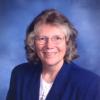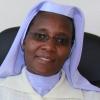"My biggest takeaway from working with the sisters would far and away be the amount of happiness and smiles that can be shared. The sisters' life calling is to help those in most need. It is not a chore, but something they are happy to do and look forward to each day. I love volunteering, and this trip offered me everything I wanted in the span of just one week. I was happy to sign up and come along for the adventure."
Notes From the Field - I was most drawn to the social justice tenet of the Good Shepherd Volunteers program. But my passion to hit the ground running came up against a pretty big wall upon my arrival to Chile.
No one thinks it will be easy to pressure nuclear states, but public support for disarmament can be built over time, peace activists argue. "You can't think pressure won't make a difference," says Sr. Stacy Hanrahan. "It will."
"Peeking out from under, small signs shine with hope as we stand for the truth and light."
The Eighth Station is a fitting meditation for a cluster of my experiences in India that illustrate how church people continue to live this moment in the passion of Jesus — a moment of compassion.
Maryknoll Sr. Helen Graham was raised in New York but has served in the Philippines for the past 49 years, primarily teaching theology, often to religious in formation. "Studying theology and Scripture gives you a stronger foundation for what you're doing. You're not just a nun with a habit on."
"We, the baptized, are privileged to live a sacramental life. We live on the knife edge between life and death, at the intersection of time and eternity. We can look into one another's eyes and catch a glimpse of love that will last forever."
GSR Today - If Trump's proposed cuts to foreign aid go through, we will risk our very souls to save one-tenth of 1 percent of the budget. I, for one, am not willing to take that gamble.
I come from a culture where witchcraft still reigns supreme. Witch doctors are highly consulted because, like in the rest of Africa, bad omens, such as accidents, diseases, poverty and death, don't just happen. Somebody is believed to have cast a spell on the victim and, therefore, witch doctors come in handy to unravel the hidden mystery.
Rwanda is a beautiful country, with hills as far as the eye can see. The complicated history and widespread government control are a bit more difficult to see, hovering just beneath the surface of Rwanda's status as the 'poster child of Africa.'






